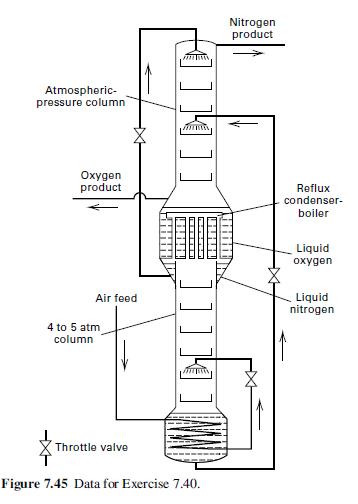Question: Performance data for a distillation tower separating a 50/50 by weight percent mixture of methanol and water are as follows: Feed rate = 45,438 lb/h;
Performance data for a distillation tower separating a 50/50 by weight percent mixture of methanol and water are as follows:
Feed rate = 45,438 lb/h; feed condition = bubble-point liquid at feed-tray pressure;

Wt% methanol in distillate ¼ 95.04; Wt% methanol in bottoms = 1.00;
Reflux ratio = 0.947; reflux condition ¼ saturated liquid;
Boilup ratio = 1.138; pressure in reflux drum = 14.7 psia;
Type condenser = total; type reboiler = partial;
Condenser pressure drop = 0.0 psi; tower pressure drop= 0.8 psi;
Trays above feed tray = 5; trays below feed tray = 6;
Total trays = 12; tray diameter = 6 ft; type tray = single-pass
sieve tray; flow path length = 50.5 inches;
Weir length = 42.5 inches; hole area = 10%; hole size = 3 / 16 inch;
Weir height = 2 inches; tray spacing =24 inches;
Viscosity of feed = 0.34 cP; Surface tension of distillate = 20 dyne/cm;
Surface tension of bottoms = 58 dyne/cm;
Temperature of top tray = 154F; temperature of bottom tray 207οF
Vapor–liquid equilibrium data at column pressure in mole fraction of methanol are

Based on the above data:
(a) Determine the overall tray efficiency assuming the reboiler is equivalent to a theoretical stage.
(b) Estimate the overall tray efficiency from the Drickamer–Bradford correlation.
(c) Estimate the overall tray efficiency from the O’Connell correlation, accounting for length of flow path.
(d) Estimate the Murphree vapor-tray efficiency by the method of Chan and Fair.

Atmospheric- pressure column Oxygen product Air feed 4 to 5 atm column Throttle valve FREEWAY www Figure 7.45 Data for Exercise 7.40. Nitrogen product Reflux condenser- boiler Liquid oxygen Liquid nitrogen
Step by Step Solution
3.45 Rating (165 Votes )
There are 3 Steps involved in it
To determine the overall tray efficiency assuming the reboiler is equivalent to a theoretical stage ... View full answer

Get step-by-step solutions from verified subject matter experts


